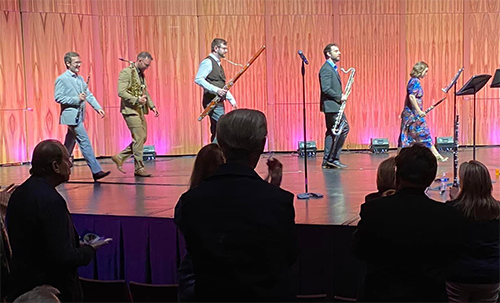by Peter Feher

The quirky Detroit-based ensemble opened its November 7 performance for Akron’s Tuesday Musical series with this piece, and it was a way to let the audience at E.J. Thomas Hall in on everything they needed to know.
There’s a reason that Mellits’ 2014 composition has become the surest introduction to this novel type of chamber group. In eight miniature movements, each named after a species of tree, Splinter makes excellent and entertaining use of the affinities shared by reed instruments. The combined woodwind sound of oboe, clarinet, alto saxophone, bassoon, and bass clarinet is dark and gritty, but also flexible, and these distinctive features have a lot to do with the lowest members of the ensemble.
This is an ensemble that’s built from the ground up, and Splinter taps into that sturdiness. Bass clarinetist Andrew Koeppe had a seemingly endless stream of notes to thump out and grind away at, and his delivery was relaxed and instantly ear-grabbing. Sometimes in Mellits’ work, bassoonist Ryan Reynolds joined in on the same line to create a monstrous sort of double instrument, and at other times, he helped flesh out the smooth middle voices from saxophonist Matt Landry and clarinetist Kari Landry. On top of it all, oboist Tim Gocklin offered sensitive solos that were often as simple as a beautiful, sustained drone.
Expanding the reed-quintet repertoire from there has been an ongoing project for Akropolis. The first half of Tuesday’s concert closed with Omar Thomas’ Moods and Attitudes, a welcome new piece that the group premiered earlier this year and that takes these musicians in a different stylistic direction.
Thomas is an experienced jazz composer, and he writes for the quintet like they’re the front-line section of a big band. The first movement, “Blues shuffle kerfuffle,” featured a wailing oboe solo for Gocklin, who sounded more like he was playing the world’s meanest soprano sax.
“Swan song, so long,” the slow central movement, handed the cool melodic line over to Matt Landry on alto sax, the instrument that really bridges the jazz and classical worlds here. (Landry would also handle most of the solo part for the group’s encore at the end of the evening, an arrangement of For All We Know in the vein of Nina Simone.) And everyone got the chance to jam on the unison licks in Thomas’ final movement, “Bebop, won’t stop.”
Akropolis returned to familiar territory for the program’s second half, which paired two contrasting pieces associated with the Calefax Reed Quintet — the pioneering ensemble of this type when it formed in 1985.
Akropolis put its own thoughtful touch on Willem Jeths’ 2013 Maktub, a calm, contemplative work that explores the subtle tonal differences between these similar reed instruments. And a quintet version of George Gershwin’s An American in Paris — complete with the alto sax honking where the car horns should have been — concluded the performance with a characteristic mix of tradition and novelty.
Published on ClevelandClassical.com November 16, 2023
Click here for a printable copy of this article


